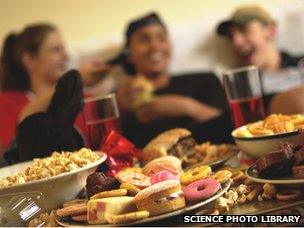'Fewer crisps for healthy teenagers but some skip meals'
- Published

Figures going back to the 1980s suggest modern teenagers eat better than previous generations
Teenagers in England are eating less fatty food and more vegetables than previous generations - but some are skipping meals to lose weight, according to research.
The figures are based on interviews with 750,000 teenagers over 30 years.
Between 2000 and 2010, the proportion eating crisps on most days halved - with a similar drop for sweets.
Dr David Regis, of the Schools Health Education Unit, said: "Teenagers are eating better."
Dr Regis and his team collated figures from surveys of the eating habits of 11- to 15-year-olds dating back to the 1980s and compared the results with a survey of more than 80,000 teenagers in 2010.
The findings appear to show that messages about healthy eating are getting through.
In 1987 more than a third of 14- and 15-year-old boys said they ate sugar-coated breakfast cereals on most days. By 2010 the figure had dropped to 16%.
In 2000 more than a quarter of 12- and 13-year-old girls said they ate chips or roast potatoes on most days. By 2010 the number was down to 11%.
The findings suggest that teenagers are eating more vegetables. In 2010 almost half of 12- and 13-year-old boys said they ate vegetables on most days - up from around a third of the equivalent group in 1999.
The figures also show falls in the frequency with which teenagers eat meat and dairy products.
Tuck-shop police
"When I go to the supermarket I see a wall of crisps and sweets. So we asked ourselves do we believe these results? And I think we do," said Dr Regis.
"Schools are serving better school dinners and they are also taking more of an interest in the contents of pupils' lunchboxes.
"The packed lunch and tuck-shop police have been in action. Tuck shops are no longer the sea of fizzy drinks and crisps they once were."
But the figures also reveal the extent to which some pupils are skipping meals to lose weight.
In 2010 almost a third of Year 10 girls (14- and 15-year-olds) had nothing to eat for breakfast. A quarter of these girls had also missed lunch the day before.
Since 1986 there has been an upward trend in the numbers of pupils who do not eat lunch - although figures for those missing breakfast do not show a similar rise, partly because of changes in the way the information was collected.
The figures consistently show that a higher proportion of the older girls skip meals.
These older girls were also more likely to say they wanted to lose weight. In 1991 the proportion of 14- and 15-year-old girls on a diet rose from just over half in 1991 to 60% by 2010.
Dr Regis said: "As a secondary analysis, we also recorded the pupils' weight and height and we did not find that this number of pupils were overweight.
"There is some genuine cause for concern here. Do 60% of Year 10 females need to lose weight? Probably not."
Dr Regis added: "The good news is that teenagers are eating better. The bad news is that some are skipping meals, which is not healthy.
"There has been a tendency for the government and schools to promote the healthy eating message loudly, by megaphone.
"You can't do the same about skipping meals being a bad idea. A bit of listening to what teenagers are really thinking wouldn't go amiss," he said.
- Published21 July 2011
- Published25 June 2010